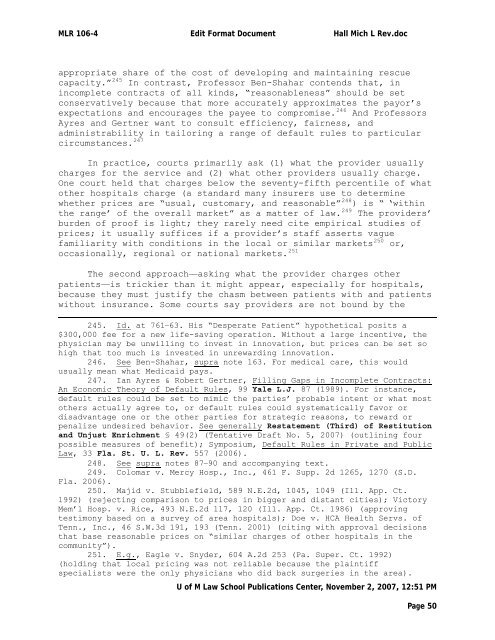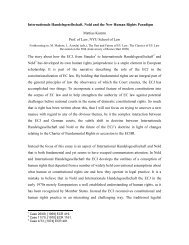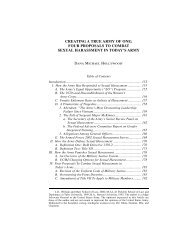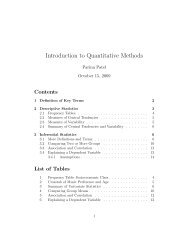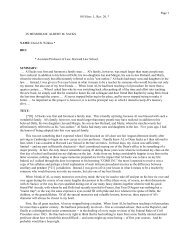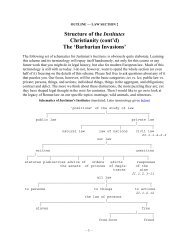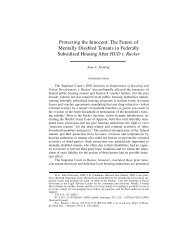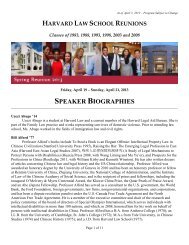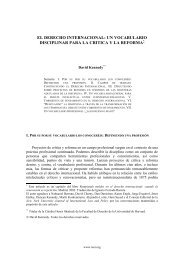Patients as Consumers - Harvard Law School
Patients as Consumers - Harvard Law School
Patients as Consumers - Harvard Law School
You also want an ePaper? Increase the reach of your titles
YUMPU automatically turns print PDFs into web optimized ePapers that Google loves.
MLR 106-4 Edit Format Document Hall Mich L Rev.doc<br />
appropriate share of the cost of developing and maintaining rescue<br />
capacity.” 245 In contr<strong>as</strong>t, Professor Ben-Shahar contends that, in<br />
incomplete contracts of all kinds, “re<strong>as</strong>onableness” should be set<br />
conservatively because that more accurately approximates the payor’s<br />
expectations and encourages the payee to compromise. 246 And Professors<br />
Ayres and Gertner want to consult efficiency, fairness, and<br />
administrability in tailoring a range of default rules to particular<br />
circumstances. 247<br />
In practice, courts primarily <strong>as</strong>k (1) what the provider usually<br />
charges for the service and (2) what other providers usually charge.<br />
One court held that charges below the seventy-fifth percentile of what<br />
other hospitals charge (a standard many insurers use to determine<br />
whether prices are “usual, customary, and re<strong>as</strong>onable” 248 ) is “ ‘within<br />
the range’ of the overall market” <strong>as</strong> a matter of law. 249 The providers’<br />
burden of proof is light; they rarely need cite empirical studies of<br />
prices; it usually suffices if a provider’s staff <strong>as</strong>serts vague<br />
familiarity with conditions in the local or similar markets 250 or,<br />
occ<strong>as</strong>ionally, regional or national markets. 251<br />
The second approach—<strong>as</strong>king what the provider charges other<br />
patients—is trickier than it might appear, especially for hospitals,<br />
because they must justify the ch<strong>as</strong>m between patients with and patients<br />
without insurance. Some courts say providers are not bound by the<br />
245. Id. at 761–63. His “Desperate Patient” hypothetical posits a<br />
$300,000 fee for a new life-saving operation. Without a large incentive, the<br />
physician may be unwilling to invest in innovation, but prices can be set so<br />
high that too much is invested in unrewarding innovation.<br />
246. See Ben-Shahar, supra note 163. For medical care, this would<br />
usually mean what Medicaid pays.<br />
247. Ian Ayres & Robert Gertner, Filling Gaps in Incomplete Contracts:<br />
An Economic Theory of Default Rules, 99 Yale L.J. 87 (1989). For instance,<br />
default rules could be set to mimic the parties’ probable intent or what most<br />
others actually agree to, or default rules could systematically favor or<br />
disadvantage one or the other parties for strategic re<strong>as</strong>ons, to reward or<br />
penalize undesired behavior. See generally Restatement (Third) of Restitution<br />
and Unjust Enrichment § 49(2) (Tentative Draft No. 5, 2007) (outlining four<br />
possible me<strong>as</strong>ures of benefit); Symposium, Default Rules in Private and Public<br />
<strong>Law</strong>, 33 Fla. St. U. L. Rev. 557 (2006).<br />
248. See supra notes 87–90 and accompanying text.<br />
249. Colomar v. Mercy Hosp., Inc., 461 F. Supp. 2d 1265, 1270 (S.D.<br />
Fla. 2006).<br />
250. Majid v. Stubblefield, 589 N.E.2d, 1045, 1049 (Ill. App. Ct.<br />
1992) (rejecting comparison to prices in bigger and distant cities); Victory<br />
Mem’l Hosp. v. Rice, 493 N.E.2d 117, 120 (Ill. App. Ct. 1986) (approving<br />
testimony b<strong>as</strong>ed on a survey of area hospitals); Doe v. HCA Health Servs. of<br />
Tenn., Inc., 46 S.W.3d 191, 193 (Tenn. 2001) (citing with approval decisions<br />
that b<strong>as</strong>e re<strong>as</strong>onable prices on “similar charges of other hospitals in the<br />
community”).<br />
251. E.g., Eagle v. Snyder, 604 A.2d 253 (Pa. Super. Ct. 1992)<br />
(holding that local pricing w<strong>as</strong> not reliable because the plaintiff<br />
specialists were the only physicians who did back surgeries in the area).<br />
U of M <strong>Law</strong> <strong>School</strong> Publications Center, November 2, 2007, 12:51 PM<br />
Page 50


